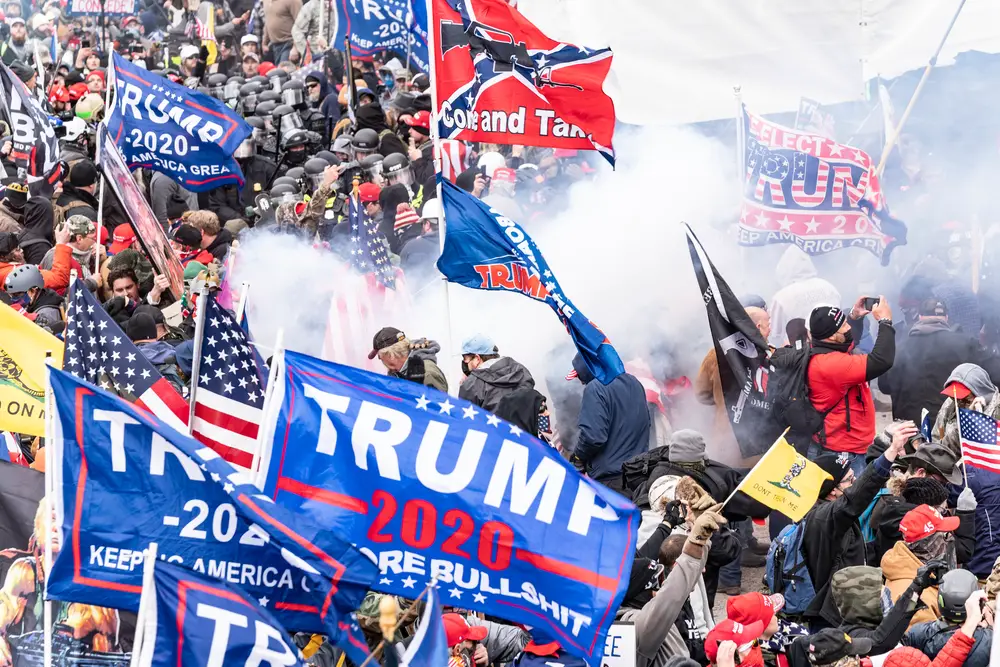Although the Senate acquitted Donald Trump in his impeachment trial, the armed attack on the US Capitol by the former president’s extremist followers continues to dominate the news.
In the short term, the issue of security permeates conversations taking place in Congress, with US defense officials confirming that housing the National Guard in Washington, DC will cost almost half a billion dollars.
Over the long term, however, we should not limit ourselves to thinking only in terms of intelligence, policing, and tactical defense.
As a rhetoric professor at San José State University, I teach students that rhetoric can have real-world consequences. Understanding the rhetorical dimensions and existential threat of the attempted coup is crucial to understanding the challenges ahead for the United States.
In particular, Americans need to come to grips with the powerful authoritarian rhetoric that undergirds how we talk about justice.
2011 UC Davis Protest
In 2011, a group of college students organized an Occupy-style protest at the University of California (UC), Davis to combat tuition hikes in particular and income inequality more generally. When the students refused to disperse, campus police attacked them.
Although the protestors were non-violent, campus police officer Lt. John Pike famously sauntered up and down the line of seated students, crop-dusting them with pepper spray.
The scene at UC Davis was very different from the chaos in Washington, DC, but the differences are instructive.
The majority of UC Davis protestors were students enrolled at a highly-selective school, and they were protesting non-violently. In short, the students posed no direct threat to the police.
So what was the indirect threat? Disobedience. The police issued a command, it was rebuffed, so they punished what they identified as disobedience. It was a physical reaction to a symbolic slight.
In fact, failure to “obey authority” is routinely used as a justification for police violence.
It can also be heard in Trump’s comments on January 6 that “when you catch somebody in a fraud, you’re allowed to go by very different rules,” and “if you don’t fight like hell, you’re not going to have a country anymore.”
Rhetorical Challenges Ahead
What do UC Davis and the Capitol attack tell us about the rhetorical challenges ahead of us?
For one, protests, riots, and insurrections are never limited to physical confrontation. There is always a rhetorical element — both reactive and potentially persuasive — to such occurrences, and understanding the rhetoric is necessary to understand the confrontation.
For another, the symbolic ways protestors and authorities see each other dictates how they act toward each other. The UC Davis protestors saw an illegitimate assertion of power. Lt. Pike saw disobedient subjects in need of correction.
In Washington, Capitol police and insurrectionists clearly saw each other through different lenses. Capitol police were violently attacked, but Trump’s mob also included off-duty police.
We got our first public hearing regarding the January 6 insurrection today — 48 days after the deadly attack.
And as the former Capitol police chief describes it: “These criminals came prepared for war.” pic.twitter.com/YZuLHSzymN
— The Recount (@therecount) February 24, 2021
Some rioters snapped selfies with officers. They carried Blue Lives Matter flags. At the beginning of the gathering, the rioters saw law enforcement as allies.
For their part, law enforcement didn’t identify the mob as “disobedient” in the same way the UC Davis’ campus police saw the student protestors or in the way law enforcement has seen #BLM protestors. The Capitol police apparently expected “a pretty large percentage of this group to act with a basic respect for the rules” despite abundant reasons to anticipate violence.
Racial Dimension
The additional wrinkle, of course, is that race — which is to say, non-whiteness — is codified in the US as fundamentally unruly. Since at least the 15th century, Black, Indigenous, and other people of color have been characterized as disobedient for being non-European, and later, not white.
While there was undoubtedly a racial dimension to the Capitol police’s response, the UC Davis comparison offers a slightly wider frame.
Most of the UC Davis protestors were either white or model minorities. Anti-Black racism was not a direct catalyst for the violence meted out by Pike and his colleagues. The UC Davis protests suggest law enforcement has a deep investment in obedience irrespective of protestors’ race.
Even if we don’t ascribe conscious racism to the police, it was clear the mob was perceived as rhetorically obedient until they were physically disobedient. By that point, it was too late.
Rhetorical Problem
We have trained ourselves to think of justice as equivalent to authority, power, and obedience. It’s no surprise, then, that people who appear obedient are treated differently than their “disobedient” counterparts. It’s a rhetorical problem that produces a violent reaction.
The allegiance to authoritarian rhetoric is not exclusive to Republicans or conservatives. However, the January 6 riot is a reminder of how important rhetoric’s role is in our daily lives.
The president’s words incited the mob to action. But the police response was equally guided and informed by language and symbols.
As Americans consider how to proceed after January 6, a central challenge will be to tease out the rhetorical threads that brought us to this security crisis and find ways to realign our rhetoric with a more just and equitable future.
 Ryan Skinnell is an associate professor of rhetoric at San José State University, the author Faking the News: What Can Rhetoric Teach Us about Donald J. Trump, and a Public Voices Fellow with The OpEd Project.
Ryan Skinnell is an associate professor of rhetoric at San José State University, the author Faking the News: What Can Rhetoric Teach Us about Donald J. Trump, and a Public Voices Fellow with The OpEd Project.
DISCLAIMER! The views and opinions expressed here are those of the author and do not necessarily reflect the editorial position of The College Post.



